外研社高中英语第三册第二单元book3unit2课文翻译thewellthatchangedtheworld,thepowerofgood
2019外研社高中英语必修三Unit 3 The World of Science短语英汉互译表

on account of
47
name ... after...
48
go off
49
the origin of species
50
natural selection
51
due to
52
take place
53
establish the truth
54
field research
55
along with
69
实际上;其实;确切地说
70
开国元勋
71
独立宣言
72
从古至今;纵观历史
73
此刻;目前
74
激励某人做某事
75
死于...
76
除了...
77
集中于
78
一道闪电
79
灵机一动
80
一个电击
81
而且;更重要的是;另外
82
不止一个
83
(做)..85
把…塞进…
86
既不是……也不是……
35
就某人而言
36
低头看…
37
连...也包括在内
38
例如
39
一颗跳动的心脏
40
破门而入,闯入
41
被看作是;被确认为;被公认为
42
在这些领域
43
把...拴/系在...上
44
小行星
45
把...考虑在内
46
考虑到;因为,由于
47
以...命名
48
(警报器)突然大作;(电器设备)停止运转
49
物种起源
50
自然选择
汉译英
【新教材】高中英语外研版必修第三册: Unit 2 全章课件
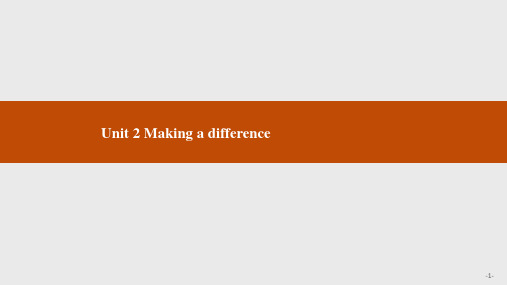
Florence returned to Britain as a heroine.Because of her excellent work she was given many awards.With the funds she received,Florence set up a nursing school to train professional nurses.She continued to offer her advice on hospital reform.Nightingale is best known as the founder of the modern profession of nursing.In 1910,at the age of 90,Nightingale closed her eyes forever.And the day of her birth,May 12,has been made International Nurses Day.
【词汇拓展】 contribute vt.& vi.捐款;贡献;捐助;导致;投稿 contributor n. 贡献者;捐助者;投稿者 contribute sth to...把某物捐献给…… contribute to为……作贡献;有助于;导致 make a contribution/contributions to为……作出贡献 Everyone is willing to contribute food and clothes to the homeless people. 每个人都愿意为无家可归的人捐献食物和衣服。 The film will greatly help us students know the school’s history better and appeal to us to make contributions to our school’s development. 这部电影将会极大地帮助我们学生更好地了解学校的历史,呼吁我 们为学校的发展作贡献。
外研社高中英语第三册第二单元Book3unit2课文翻译the well that changed the world, the power of good
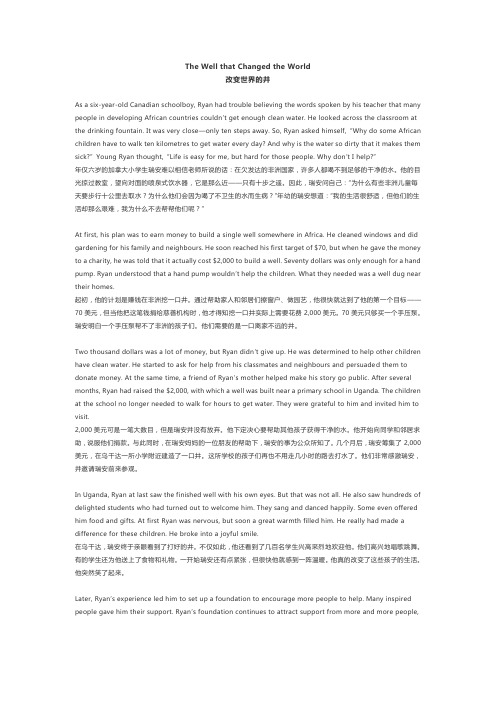
The Well that Changed the World改变世界的井As a six-year-old Canadian schoolboy, Ryan had trouble believing the words spoken by his teacher that many people in developing African countries couldn’t get enough clean water. He looked across the classroom at the drinking fountain. It was very close—only ten steps away. So, Ryan asked himself, “Why do some African children have to walk ten kilometres to get water every day? And why is the water so dirty that it makes them sick?”Young Ryan thought, “Life is easy for me, but hard for those people. Why don’t I help?”年仅六岁的加拿大小学生瑞安难以相信老师所说的话:在欠发达的非洲国家,许多人都喝不到足够的干净的水。
他的目光掠过教室,望向对面的喷泉式饮水器,它是那么近——只有十步之遥。
因此,瑞安问自己:“为什么有些非洲儿童每天要步行十公里去取水?为什么他们会因为喝了不卫生的水而生病?”年幼的瑞安想道:“我的生活很舒适,但他们的生活却那么艰难,我为什么不去帮帮他们呢?”At first, his plan was to earn money to build a single well somewhere in Africa. He cleaned windows and did gardening for his family and neighbours. He soon reached his first target of $70, but when he gave the money to a charity, he was told that it actually cost $2,000 to build a well. Seventy dollars was only enough for a hand pump. Ryan understood that a hand pump wouldn’t help the children. What they needed was a well dug near their homes.起初,他的计划是赚钱在非洲挖一口井。
普通高中英语(2019版)必修第三册book3 unit2课文二翻译
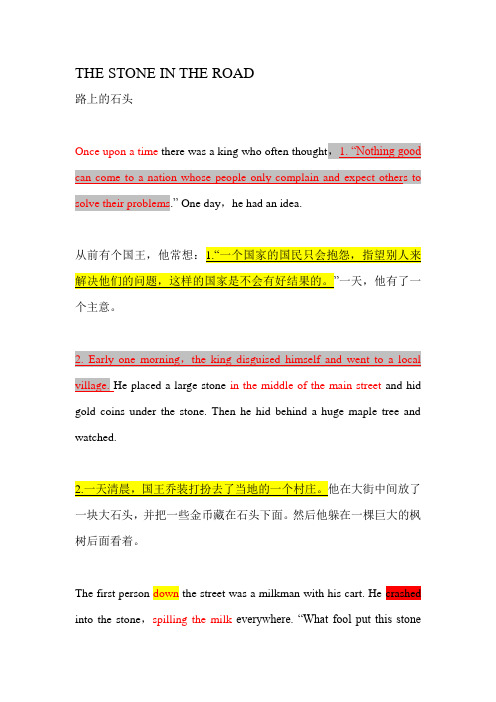
THE STONE IN THE ROAD路上的石头Once upon a timesolve their problems.” One day,he had an idea.一天,他有了一个主意。
in the middle of the main street and hid gold coins under the stone. Then he hid behind a huge maple tree and watched.一块大石头,并把一些金币藏在石头下面。
然后他躲在一棵巨大的枫树后面看着。
The first person down the street was a milkman with his cart. He crashed into the stone,spilling the milk everywhere. “What fool put this stonehere?” he shouted. He picked himself up and angrily went away.沿街走来的第一个人是一个推着手推车的送奶工。
他撞到石头上,把牛奶洒得到处都是。
“哪个傻瓜把这块石头放在这里的?”他喊道。
他站了起来,怒气冲冲地走开了。
After a while,a group of women came along,each balancing a pot ofpicked herself up and limped away intearsThe king watched all day as many people complained about the stone,but he found nobody making an attempt to move it. The king was in despair.5.“Is t here no one in this village who feels any responsibility to keep their neighbours from harm? ”国王整天看着许多人抱怨这块石头,但他发现没有人试图移动它。
外研社高中英语第三册第二单元book3Unit 2 Using language 听力课件

[例2] I hesitated a lot about whether to tell him the bad news.
[造句] 需要任何帮助都不要犹豫给我打电话。
____D_o_n_'_t_h_e_s_it_a_t_e_t_o_c_o_n_t_a_c_t_m__e_i_f _y_o_u_n__ee_d__a_n_y__h_e_lp_.__________
Neutral
sensitive serious bookish shy
Negative nervous
lazy
Work in pairs. Talk about people’s personal qualities using the words you have learnt.
A: I think my cousin is very brave. B: Why do you think so? …
[听力原文]
1. hesitate v.犹豫,迟疑
She is usually very shy, but she's generous and never hesitates to
help. (教材P18) 她通常很害羞,但是当帮忙时从来不迟疑。
(1) hesitate to do sth. 犹豫做某事
(2) hesitation n.
犹豫,踌躇,迟疑;不情愿
(3) without hesitation 毫不犹豫地
[例1] The Mullers didn't hesitate to give their phone number to the street
people and told them to phone anytime.
2019新外研版高中英语选择性必修三第二单元课文及翻译(含课文朗读MP3)

MP3免费下载链接:https:///s/1HvbcQVU93zqIpCn7j0OZVQ提取码:zv53复制这段内容后打开百度网盘手机App,操作更方便哦Unit 2Understanding ideasLife Behind the Lens镜头背后的人生A white-haired old man riding an ordinary bicycle around the streets of New York, always wearing the same blue worker's jacket and simple black running shoes. If you saw him,you'd never think there was anything remarkable about him. And yet every member of New York's wealthy high society wanted nothing more than to pose for this man.一位白发老人总是穿着一件蓝色工装夹克和样式简单的黑色跑鞋,骑着一辆普通的自行车在纽约街头穿梭。
如果你看到他,你不会觉得他有任何引人注目的地方。
然而,纽约富裕的上流社会中每一个人都想着对他摆姿势、请他拍照。
This ordinary-looking man was Bill Cunningham, one of the most important American photographers of the last 50 years.这位看起来普普通通的人就是比尔坎宁安,美国近五十年来最重要的摄影师之一。
What made Cunningham so great? It certainly wasn't the use of expensive technologically-advanced equipment. Cunningham always used simple, relatively cheap cameras and took all his pictures on the streets of New York, not in a studio. Nor was it a wide range of contacts and connections. Although he always knew where fashionable parties and events were happening, Cunningham liked to photograph ordinary people in the poor Bronx as much as VIPs in rich Manhattan. He found inspiration where others could not, in simple, everyday scenes, such as a man buying oranges at the local grocery store, or a woman riding home on the graffiti-covered subway. These things were real, and it was within their reality that Cunningham saw both beauty and potential. Through his fascination with what people were wearing, and not who they were, he opened the doors of fashion to everyone -fashion as he saw it belonged to the people, not just to high society and big brands.是什么使得坎宁安享有如此盛誉?当然不是因为他用了昂贵先进的设备。
2019外研社高中英语选修三Unit 2 A life’s Work短语英汉互译表
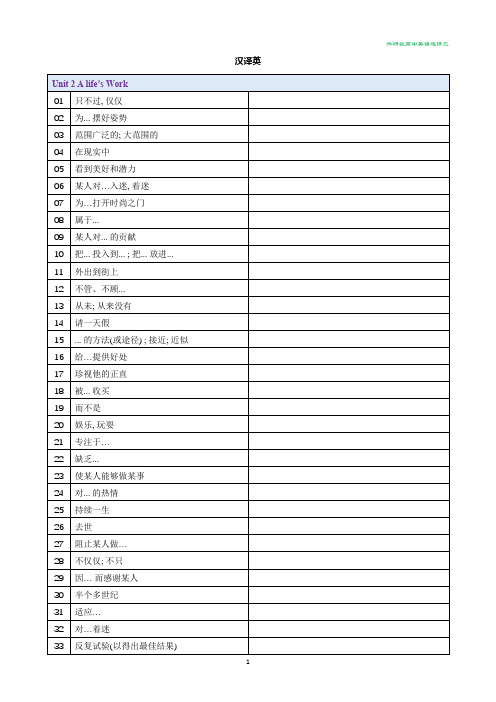
participate in
60
devote (oneself) whole-heartedly to…
61
(be) apart from
62
keep on doing sth.
63
refuse to do
64
back down (from)
65
at the cutting edge of
66
think outside the box
by/through trial and error
34
care for
35
(be) open to …
36
one beloved site for…
37
five-star review(s)
38
result in
39
thanks to
40
a lifetime of
41
be born into…
42
通过艰苦卓绝的努力
94
使…恢复生机
95
既不...也不...
96
(给钟)上弦
97
静止不动
98
恢复生机
99
与时间竞争的比赛
100
对…依然乐观
101
追随…的足迹
102
传递(信息) ...给...
103
承担;呈现;雇用
104
占用;开始干(工作)
105
经受时间的考验
106
在快节奏的世界
107
时光不等人。
108
54
经历复兴
55
对...的渴望
56
...的结合
57
说明
外研版高中英语必修3课文翻译[小编推荐]
![外研版高中英语必修3课文翻译[小编推荐]](https://img.taocdn.com/s3/m/4d8b113ca9114431b90d6c85ec3a87c240288aff.png)
外研版高中英语必修3课文翻译[小编推荐]第一篇:外研版高中英语必修3课文翻译[小编推荐]Module1 巴黎是法国的首都,也是法国最大的城市,坐落在塞纳河畔。
巴黎是世界上最漂亮的城市之一,每年有超过八百万的游客来这里旅游。
最受游客欢迎的旅游景点是埃菲尔铁塔,它是巴黎著名的象征。
世界上最大的美术馆之一——卢浮宫,也在巴黎。
这个城市也以餐馆、咖啡馆和剧院而闻名。
法国大约三分之二的艺术家和作家都生活在巴黎。
BARCELONA巴塞罗那.巴塞罗那是西班牙的第二大城市,它位于西班牙东北海岸,大概在离西班牙首都马德里东边五百千米的地方。
巴塞罗那最著名的标志性建筑之一就是由建筑师安东尼奥?高迪建造的圣家大教堂。
高迪从1882年起从事这项工程直至1926年逝世,这座家庙还没有竣工。
FLORENCE佛罗伦萨佛罗伦萨是意大利的一座城市,这座城市因文艺复兴而变得著名。
文艺复兴是一次大型的文艺运动,开始于13世纪,持续了三百年。
在文艺复兴时期,历史上一些最伟大的画家在佛罗伦萨生活和工作。
佛罗伦萨很多非常漂亮的油画和雕塑都是由伟大的艺术家如莱昂纳多?达?芬奇和米开朗琪罗创作的。
每年大约有一百万的游客来佛罗伦萨参观美术馆、教堂和博物馆,乌菲齐美术馆是这座城市最著名的美术馆。
ATHENS雅典雅典是希腊的首都,作为西方文明的发源地而闻名于世。
2400年前,雅典是世界上最强大的城市。
女神像位于雅典卫城山的帕台农神庙这样的建筑等就是在那个时期建造的。
希腊最优秀的作家就住在古雅典,他们的作品影响了后世的作家。
Module2 人类发展报告2000年,147个国家领导人达成协议,一起努力到2015年甚至更早缓解贫困,这个协议达成后便产生了《人类发展报告》。
这个报告最重要的一部分就是“人类发展指标”,这对175个国家的成果做了分析检测。
这项指标从三个方面衡量一个国家的成就:寿命(人们通常能活多久)、教育和收入。
这项指标显示了一些令人感到意外的情况。
外研版高中英语必修第三册课文翻译

Unit1 knowing you knowing me课文翻译深陷痛苦!知心阿姨解答你的问题。
亲爱的知心阿姨:我现在一团糟——希望你能帮我一把!我17岁,是我们学校篮球队的一员。
我对篮球很着迷,也很擅长,这可能就是我们输掉上一场比赛时我很生气的原因。
我们打得很好,但我觉得球队被我们的控球后卫给拖累了。
控球后卫是一个关键球员,但他好像根本不在场上!我对他的行为感到失望,把这一切都告诉了我最好的朋友。
我真的只是宣泄情绪,因为我实在是太生气了。
可是,后来我的朋友却把我说的话告诉了其他所有人。
这太尴尬了。
我很生我朋友的气——我该对他说什么?我应该对我的队友说些什么吗?又尴尬又羞愧,我无法集中精力做任何事。
请帮帮我!本亲爱的本:美国有句谚语:“祸从口出。
”这意味着如果你过多地谈论某件事,尤其是对你不太了解的人,就会引起各种各样的麻烦。
这里的情况更糟,因为“口风不紧”的是你最好的朋友。
你被如此对待,肯定会感到受伤——我们应该总是能够信任那些与我们最亲近的人,当我们发现他们不能信任的时候,伤害会更大。
但我不得不说,这在一定程度上是你的错。
不是吗?你承认你在“发泄怒气”。
在那种情况下是可以理解的,但我们说话之前应该三思。
下面是你需要做的。
首先,向你的队友道歉。
如果你们还想赢篮球比赛(我相信你们想!),你们需要合作,这意味着与对方沟通清楚并解决冲突。
所以和你的队友聊聊天吧。
直接、诚实地告诉他你不经考虑就说了话。
然后,和你的朋友谈谈。
友谊应该是世界上最伟大的事情之一,但有时它可能是困难的。
同样,你的策略是明白地沟通。
告诉你的朋友,你很生他的气,因为他复述了你说的话给他人,让情况变得更糟,但你想要向前看。
以这种方式处理,你们的友谊很快就会修复。
第三,或许也是最重要的,想想自己的行为。
当你生气的时候不要说太多!你满腔怒火,想说什么就说什么,这给了人们错误的信号。
深吸一口气,冷静下来,永远记住:先想后说。
如果你觉得你的队友没有尽职尽责,那就以专业的方式向你的团队教练提出你的忧虑。
外研社高中英语第三册第二单元book3unit2 Developing ideas the power of good课件PPt
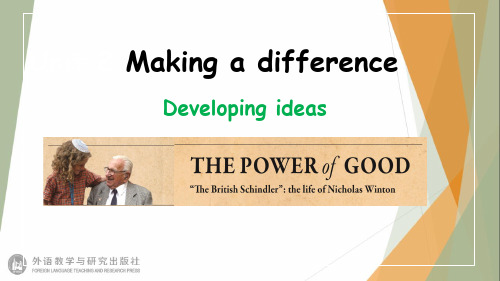
Post-Reading
Activity 4 Work in groups. Give a talk in honour of Nicholas Winton.
Give a talk to the class
Hello, everyone! Now I am pleased to talk about Nicholas Winton, a respected figure of mine, who is well-known as “The British Schindler” across the world.
5.Which order is right? A
a.Wilton left the military. b.He was awarded the Order of the White Lion. c.He went to Prague to help refugees escape from the Nazis.
2.What did Nicholas Winton do as soon as he left school? B
A.He worked in banks in Britain. B.He worked in banks in Germany and France. C.He worked as a rescuer. D.He didn’t do any job.
Do you know of any Chinese who have acted in a similar way to Winton?
• He Fengshan (何凤山) was the Consulate General of China in Austria (中国驻奥地利 总领事) from 1938 to 1940.
高中英语外研社2019新版教材必修三unit2 making a difference课文中英文

纯手打,欢迎各位英语爱好者下载Unit2 making a differenceThe well that changed the worldAs a six-year-old Canadian schoolboy, Ryan had trouble believing the words spoken by his teacher that many people in developing African countries couldn’t get enough clean water. He looked across the classroom at the drinking fountain. It was very close – only ten steps away. So, Ryan asked himself, “Why do some African children have to walk ten kilometres to get water every day? And why is the water so dirty that it makes them sick?” Young Ryan thought, “Life is easy for me, but hard for those people. Why don’t I help?”At first, his plan was to earn money to build a single well somewhere in Africa. He cleaned windows and did gardening for his family and neighbours. He soon reached his first target of $70, but when he gave the money to a charity, he was told that it actually cost $2,000 to build a well. Seventy dollars was only enough for a hand pump. Ryan understood that a hand pump wouldn’t help the children. What they needed was a well dug near their homes.Two thousand dollars was a lot of money, but Ryan didn’t give up. He was determined to help other children have clean water. He started to ask for help from his classmates and neighbours and persuaded them to donate money. At the same time, a friend of Ryan’s mother helped make his story go public. After several months, Ryan had raised the $2,000, with which a well was built near a primary school in Uganda. The children at the school no longer needed to walk for hours to get water. They were grateful to him and invited him to visit.In Uganda, Ryan at last saw the finished well with his own eyes. But that was not all. He also saw hundreds of delighted students who had turned out to welcome him. They sang and danced happily. Some even offered him food and gifts. At first Ryan was nervous, but soon a great warmth filled him. He really had made a difference for these children. He broke into a joyful smile.Later, Ryan’s experience led him to set up a foundation to encourage more people to help. Many inspired people gave him their support. Ryan’s foundation continues to attract support from more and more people, so the work of building more wells can go on. Today, over 800,000 people in 16 countries across Africa have benefited from the life-changing gift of clean, safe water.Now, as an adult, Ryan says that the question to ask is not “Why don’t I help?”, but “How can I help today?”. This insight grew from the determined attitude of a six-year-old boy who had the courage and perseverance to make his dream a reality.改变世界的井年仅六岁的加拿大男孩瑞安难以相信老师说的话——在欠发达的非洲国家,许多人都喝不到足够的干净的水。
2021新外研版高中英语必修三全册课文及翻译(中英文对照)

Unit 1 Knowing me, knowing youUnderstanding IdeasDear Agony Aunt,尊敬的知心阿姨,I’m in a total mess here—hope you can help me out!我这儿一团糟——希望您能帮帮我!I’m 17, and a member of our school basketball team. I’m crazy about basketball, and pretty good at it too, which is probably why I was so mad when we lost our last match. We played well, but I felt the team were let down by one member, our point guard. The point guard is a key player, but it was like he wasn’t even on the court! Disappointed by his behaviour, I said all this to my best friend. I was just letting off steam really, because I was so angry, but then my friend went and told everyone else what I’d said.我今年17岁,是学校篮球队的一员。
我酷爱打篮球,而且打得也挺好的,也许正因如此,在我们队输掉了最近的比赛时我相当恼怒。
我们打得不错,但我感觉整个团队都被一个队友拖累了,那就是我们的控球后卫。
控球后卫是队里的关键球员,但他就像根本不在场上一样!我对他的行为感到失望,我把这些全部告诉了我最好的朋友。
我其实只是发泄一下怒气,因为我很生气,可我的朋友随后却把我的话告诉了所有人。
外研版英语必修三第二单元课文

外研版英语必修三第二单元课文Here's a sample text written in an informal and conversational style for the second unit of English Book 3, according to the requirements provided:Oh, I just love this unit! It's all about exploring different cultures and traditions. You know, sometimes it's crazy how different we can be, yet we all share this beautiful planet.Like, I remember the first time I tasted some spicy Indian curry. It was a bit of a shock, but then I realized how delicious it was! And that's just one example of how diverse food can be across cultures.Another thing that fascinated me was learning about the festivals and celebrations in different countries. You know, some cultures have these huge, elaborate festivals thatlast for days, while others have more intimate, family-oriented celebrations. It's just fascinating to see howpeople come together in different ways.Oh, and I also really enjoyed learning about the languages! It's crazy how many different languages there are in the world, and how each one has its own unique beauty and complexity. I'm definitely inspired to learn more languages now.And finally, I think it's really important to respect and appreciate other cultures. We're all different, but that's what makes the world so interesting. So let's celebrate our differences and learn from each other!。
外研社高中英语第三册第二单元book3unit2课文翻译thewellthatchangedtheworld,thepowerofgood
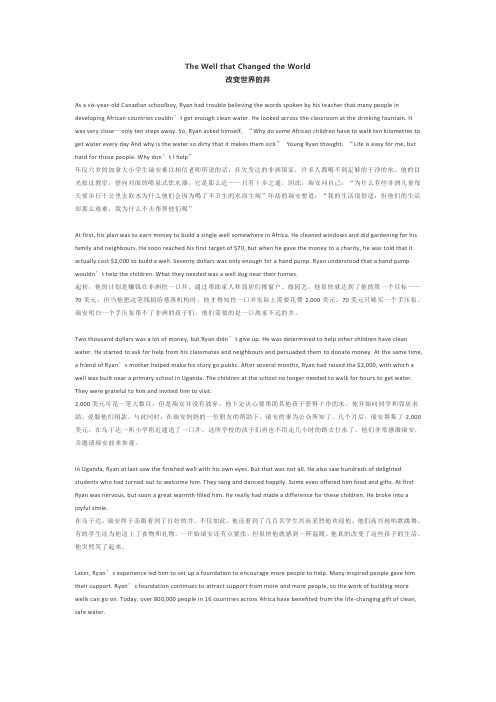
The Well that Changed the World改变世界的井As a six-year-old Canadian schoolboy, Ryan had trouble believing the words spoken by his teacher that many people in developing African countries couldn’t get enough clean water. He looked across the classroom at the drinking fountain. It was very close—only ten steps away. So, Ryan asked himself, “Why do some African children have to walk ten kilometres to get water every day And why is the water so dirty that it makes them sick”Young Ryan thought, “Life is easy for me, but hard for those people. Why don’t I help”年仅六岁的加拿大小学生瑞安难以相信老师所说的话:在欠发达的非洲国家,许多人都喝不到足够的干净的水。
他的目光掠过教室,望向对面的喷泉式饮水器,它是那么近——只有十步之遥。
因此,瑞安问自己:“为什么有些非洲儿童每天要步行十公里去取水为什么他们会因为喝了不卫生的水而生病”年幼的瑞安想道:“我的生活很舒适,但他们的生活却那么艰难,我为什么不去帮帮他们呢”At first, his plan was to earn money to build a single well somewhere in Africa. He cleaned windows and did gardening for his family and neighbours. He soon reached his first target of $70, but when he gave the money to a charity, he was told that it actually cost $2,000 to build a well. Seventy dollars was only enough for a hand pump. Ryan understood that a hand pump wouldn’t help the children. What they needed was a well dug near their homes.起初,他的计划是赚钱在非洲挖一口井。
外教社大学英语精读第三册unit2原文+翻译+课后翻译

Unit 2一、课文James Sollisch describes how his children's ability to see things in fresh ways opened his own eyes to the nature of creative thinking.詹姆斯·索利斯克描述了他是如何因他的孩子们能用新方法看事物而认清创造性思维的本质的。
Fruitful QuestionsJames SollischThe other night at the dinner table, my three kids – ages 9,6 and 4 –took time out from their food fight to teach me about paradigm shifts, and limitations of linear thinking and how to refocus parameters.获益匪浅的问题詹姆斯·索利斯克不久前的一个晚上在餐桌旁,我的三个孩子──年龄分别为9岁、6岁和4岁--暂时停止争抢食物,腾出时间教我认识什么是范式变换、什么是线性思考的局限以及如何重新看待相关的各种因素。
Here's how it happened: We were playing our own oral version of the Sesame Street game, "What Doesn't Belong?" , where kids look at three pictures and choose the one that doesn't fit. I said, "OK, what doesn't belong, an orange, a tomato or a strawberry?"事情是这样的:当时我们在玩自己那套只动嘴的―哪个不是同一类?‖的芝麻街游戏。
- 1、下载文档前请自行甄别文档内容的完整性,平台不提供额外的编辑、内容补充、找答案等附加服务。
- 2、"仅部分预览"的文档,不可在线预览部分如存在完整性等问题,可反馈申请退款(可完整预览的文档不适用该条件!)。
- 3、如文档侵犯您的权益,请联系客服反馈,我们会尽快为您处理(人工客服工作时间:9:00-18:30)。
The Well that Changed the World改变世界的井As a six-year-old Canadian schoolboy, Ryan had trouble believing the words spoken by his teacher that many people in developing African countries couldn’t get enough clean water. He looked across the classroom at the drinking fountain. It was very close—only ten steps away. So, Ryan asked himself, “Why do some African children have to walk ten kilometres to get water every day And why is the water so dirty that it makes them sick”Young Ryan thought, “Life is easy for me, but hard for those people. Why don’t I help”年仅六岁的加拿大小学生瑞安难以相信老师所说的话:在欠发达的非洲国家,许多人都喝不到足够的干净的水。
他的目光掠过教室,望向对面的喷泉式饮水器,它是那么近——只有十步之遥。
因此,瑞安问自己:“为什么有些非洲儿童每天要步行十公里去取水为什么他们会因为喝了不卫生的水而生病”年幼的瑞安想道:“我的生活很舒适,但他们的生活却那么艰难,我为什么不去帮帮他们呢”At first, his plan was to earn money to build a single well somewhere in Africa. He cleaned windows and did gardening for his family and neighbours. He soon reached his first target of $70, but when he gave the money to a charity, he was told that it actually cost $2,000 to build a well. Seventy dollars was only enough for a hand pump. Ryan understood that a hand pump wouldn’t help the children. What they needed was a well dug near their homes.起初,他的计划是赚钱在非洲挖一口井。
通过帮助家人和邻居们擦窗户、做园艺,他很快就达到了他的第一个目标——70美元,但当他把这笔钱捐给慈善机构时,他才得知挖一口井实际上需要花费2,000美元。
70美元只够买一个手压泵。
瑞安明白一个手压泵帮不了非洲的孩子们。
他们需要的是一口离家不远的井。
Two thousand dollars was a lot of money, but Ryan didn’t give up. He was determined to help other children have clean water. He started to ask for help from his classmates and neighbours and persuaded them to donate money. At the same time, a friend of Ryan’s mother helped make his story go public. After several months, Ryan had raised the $2,000, with which a well was built near a primary school in Uganda. The children at the school no longer needed to walk for hours to get water. They were grateful to him and invited him to visit.2,000美元可是一笔大数目,但是瑞安并没有放弃。
他下定决心要帮助其他孩子获得干净的水。
他开始向同学和邻居求助,说服他们捐款。
与此同时,在瑞安妈妈的一位朋友的帮助下,瑞安的事为公众所知了。
几个月后,瑞安筹集了2,000美元,在乌干达一所小学附近建造了一口井。
这所学校的孩子们再也不用走几小时的路去打水了。
他们非常感激瑞安,并邀请瑞安前来参观。
In Uganda, Ryan at last saw the finished well with his own eyes. But that was not all. He also saw hundreds of delighted students who had turned out to welcome him. They sang and danced happily. Some even offered him food and gifts. At first Ryan was nervous, but soon a great warmth filled him. He really had made a difference for these children. He broke into a joyful smile.在乌干达,瑞安终于亲眼看到了打好的井。
不仅如此,他还看到了几百名学生兴高采烈地欢迎他。
他们高兴地唱歌跳舞。
有的学生还为他送上了食物和礼物。
一开始瑞安还有点紧张,但很快他就感到一阵温暖。
他真的改变了这些孩子的生活。
他突然笑了起来。
Later, Ryan’s experience led him to set up a foundation to encourage more people to help. Many inspired people gave him their support. Ryan’s foundation continues to attract support from more and more people, so the work of building more wells can go on. Today, over 800,000 people in 16 countries across Africa have benefited from the life-changing gift of clean, safe water.后来,这段经历促使瑞安建立了一个基金会,以鼓励更多的人提供帮助。
许多深受鼓舞的人都给与瑞安支持。
瑞安的基金会不断吸引着越来越多的人给予帮助,从而使打井事业能够继续。
如今,这份能改变人一生的礼物——干净卫生的水——已经惠及了非洲16个国家的80多万人。
Now, as an adult, Ryan says that the question to ask is not “Why don’t I help”, but “How can I help today”. This insight grew from the determined attitude of a six-year-old boy who had the courage and perseverance to make his dream a reality.如今,瑞安已长大成人,他不再问“我为什么不去帮助他们”,而是“如今我该如何去帮助他们”。
这份领悟,始于一个有勇气和毅力实现梦想的六岁男孩那颗坚定不移的心。
Developing ideasThe Power of Good善行的力量“The British Schindler”: the life of Nicholas Winton“英国辛德勒”:尼古拉斯·温顿的生平It is August 1939, and a group of frightened children are boarding a train at Prague’s Wilson Station. Their heartbroken parents do not join them. Indeed, they fear they may never see their children again. But they know that their children will l ive. These are among the 669 children, most of them Jewish, that Nicholas Winton will go on to save from death at t he hands of the Nazis.1939年8月,一群心惊胆战的孩子们在布拉格的威尔逊车站登上列车。
而他们伤心欲绝的父母却没有上车。
事实上,他们害怕再也见不到自己的孩子了。
但他们知道,孩子们会活下来。
这些孩子大都是犹太人,他们是尼古拉斯·温顿即将从纳粹手里解救的669名儿童中的一部分。
Nicholas Winton was born on 19 May 1909 in London, to German-Jewish parents. The family later took British nationality. On leaving school, Winton worked in banks in Germany and France. He returned to Britain in 1931, where he worked in business.尼古拉斯·温顿1909年5月19日出生于伦敦,父母是德裔犹太人。
一家人后来加入了英国国籍。
从学校毕业后,温顿先后在德国和法国的银行工作。
他于1931年回到英国,从事商业工作。
In December 1938, a friend asked Winton to come to Prague to aid people who were escaping from the Nazis. In Prague, Winton saw people living in terrible conditions and whose lives were in danger. He decided to help transport children to safety in Britain. He established an office to keep records of the children, and then returned to Britain to find temporary homes for them. He used donated funds and his own money to pay the 50 pounds per child that the British government required. By August 1939, Winton had saved 669 children.1938年12月,一个朋友请求温顿前往布拉格帮助那里的人们逃脱纳粹的迫害。
